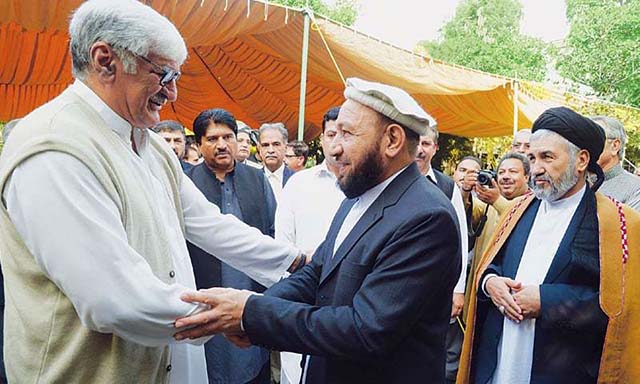Reportedly, Afghan Deputy Chief Executive Muhammad Khan along with a 45-member official delegation of the Afghan government had a trip to Pakistan on Saturday to offer condolences on the death of Pakistani veteran politician Afzal Khan Lala.
Being asked about an offer made by Pakistan to facilitate the talks, Muhammad Khan said peace would never return to the region if the two countries did not adopt a joint line of action and build trust with each other. “I had cautioned a few years back that if the Afghanistan imbroglio was not resolved, the day was not far when there would be blasts in every corner of Pakistan,” Engineer Muhammad Khan is cited as saying. “I appeal to Pakhtun leaders in Pakistan and Afghanistan to play their role for peace and stability in the war-torn country.”
Speaking on the occasion, Awami National Party President Asfandyar Wali Khan urged Pakistan and Afghanistan to begin negotiations and build trust to eliminate terrorism. He said both countries could not make progress without peace and mutual trust was essential for peace in the entire region. He added that expectations for restoration of peace had been very high after a meeting between Prime Minister Nawaz Sharif and President Ghani, but some quarters had created hurdles to spoil this opportunity.
It comes as Pakistan’s adviser to the prime minister on foreign affairs stated earlier that the time was not yet ripe for restarting the Afghan peace talks to which Pakistan, at the request of the Afghan government, had previously provided assistance. This message has a sub-text: the time is not yet ripe because of the current low level of trust prevailing between the two countries.
The relation between Kabul and Islamabad went sour following the Taliban’s heavy inroads in Afghanistan – as Afghan officials alleged that Pakistan supported the Taliban insurgents. In the wake of Shah Shaheed bombing on August 07, President Muhammad Ashraf Ghani said that Shah Shaheed bombing in Kabul was unacceptable and that it was a game changer for the country. “Pakistan still remains the venue and ground for gatherings from which mercenaries send us a message of war,” Ghani declared. He further said that at the time Pakistan’s Prime Minister Nawaz Sharif said the enemies of Afghanistan are the enemies of Pakistan, “now the time has come for him to prove it.”
Meanwhile, a Taliban splinter group, which has elected Mullah Muhammad Rassoul as Omar’s successor, declared to sit on the table of negotiation with Afghan government with precondition that the foreign troops completely withdraw from the country. Following the revelation of Omar’s death in late July, Mullah Akhtar Mansour was appointed as his successor – this caused a gap between the Taliban insurgents. Currently, a number of Afghan Taliban hold out against Mansour and has pledged loyalty to Rassoul – who served under Taliban rule as governor for Nimroz and Farah provinces before the regime was ousted in 2001.
China had facilitated a meeting between Afghan High Peace Council and Taliban representatives in the western city of Urumqi earlier this year. Subsequently, Pakistan hosted a rare face-to-face meeting between Afghan government officials and senior Taliban cadres on July 7 to set in motion what was later officially called the “Murree Peace Process”.
“We’ve already facilitated. We will offer facilitation again. And if the two sides agree, we will be ready to offer a venue. But we will not mediate.” China’s special envoy for Afghanistan Deng Xijun is quoted as saying. However, he insisted that the Chinese government wants the early revival of the Murree process.
Mistrust between Kabul and Islamabad is blamed for the breakdown of the Murree Peace Process. Asked if China could play a role in bridging the trust deficit between the two countries, Deng suggested the two neighbors find a solution to their problems through talks.
“The best way to remove misunderstandings and to increase cooperation is to sit down and talk frankly to work out the most suitable way to push forward the peace process,” he added. Deng said he agreed with what ‘Pakistani friends’ told him in Islamabad that “you cannot solve problems by fighting.”
“We will support Pakistan to continue playing its constructive and crucial role in the Afghan peace process,” said Deng, who visited Islamabad on Friday and Saturday two days after China’s foreign ministry announced his appointment as special envoy for Afghanistan.
“A sustainable solution can only be achieved through political means. This is also China’s policy,” he said. “We hope that with joint efforts the three countries – China, Afghanistan and Pakistan – can achieve this target. It is not only in the national interest of Afghanistan, but also in the national interest of China and Pakistan, and it will also benefit the entire region, especially economic development of regional countries,” the envoy stated.
About the sixth American ‘strategic review’ that envisages US troops in Afghanistan until 2017, Deng said Beijing hoped Washington would continue to handle the delicate issue of stationing troops in Afghanistan and transferring security responsibility to Afghan forces in a responsible manner.
In short, Afghanistan, Pakistan and China have expressed optimism over peace talk and seek to bring the Taliban to the table of negotiation and believe that military deal will not be a panacea for the country’s instability. On the other hand, the Taliban splinter group also gave the green light in this regard. However, the Pakistani Taliban has not signaled whether to agree or spoil the talk. Willy-nilly, negotiation is on the way, but will it bear the desired fruit? The three aforementioned countries hold out hope, but I doubt about a positive result on the grounds of repeated failures.

